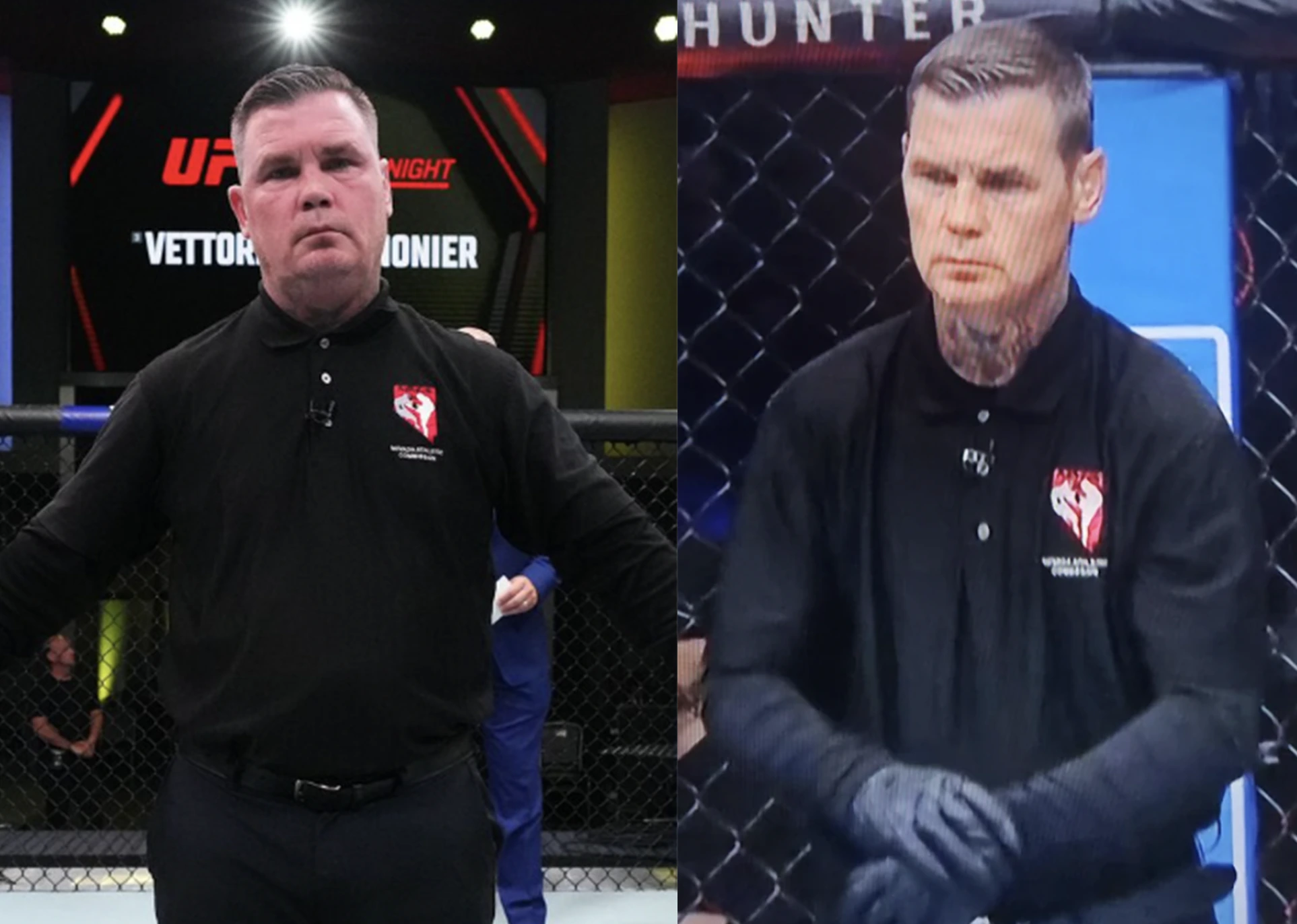When you hear the name Keith Peterson, your mind likely jumps to his long tenure as a referee in the UFC. Known for his no-nonsense approach and authoritative presence in the octagon, Keith has seen the highs and lows of the sport. But, behind the scenes, Peterson has been on a very different journey—one of personal transformation. This article dives deep into Keith Peterson’s weight loss journey, a story of struggle, resilience, and ultimately triumph.
Keith Peterson’s weight loss journey has become an inspiration to many, particularly in the often high-pressure, fast-paced world of MMA. But before he stepped into the octagon as one of the UFC’s most respected referees, Peterson faced battles that went beyond the ring—his health, weight, and the physical limitations that came with being heavier. His weight loss journey is not just about dropping pounds; it’s a story of reclaiming his health and his life.

A Struggle for Health
In 2020, Keith Peterson, at the peak of his career, weighed 200 pounds, a number that he later realized was too high for his frame. Being in a physically demanding job, it was clear that carrying extra weight wasn’t just about appearance; it was affecting his overall performance.
“I was getting to a point where it was harder to keep up with my daily routine, let alone the intense demands of being a referee at UFC events,” Keith recalls. “It wasn’t just about looking good or fitting into clothes. It was about how I felt physically, and how that affected my mental health, too.”
For Peterson, the decision to embark on a weight loss journey wasn’t something he took lightly. It came after years of battling with his weight and realizing that his unhealthy habits were taking a toll on his body. From constant fatigue to poor eating habits, Keith struggled with motivation and consistency, like many do when dealing with obesity.
However, he reached a breaking point. After a few health scares, including a high blood pressure diagnosis, Keith knew he needed to make a change.
“I had to be honest with myself,” he admits. “It wasn’t just the number on the scale. It was my energy levels, my sleep patterns, and overall well-being. It felt like I was being held back from really living.”
The Shift: Healthy Habits and Lifestyle Change
Keith Peterson didn’t take the typical route many might expect when it comes to weight loss. He didn’t turn to extreme crash diets or overnight solutions. Instead, Peterson embraced a slower, more sustainable approach.
“I started small,” he explains. “I knew I had to make lasting changes, not just short-term fixes. I began with better eating habits—cutting down on carbs, focusing more on proteins and vegetables. But it wasn’t just about what I ate—it was about how I thought about food.”
Keith admits that the mental aspect of weight loss was just as, if not more, important than the physical changes. He shifted his mindset from a place of restriction to one of mindfulness. This change wasn’t just about food but also about embracing movement and an active lifestyle.
“I wasn’t an athlete anymore, but I still wanted to feel like I could move well and be active,” Peterson recalls. “I took up walking every day, and eventually, I added more intense cardio to my routine. The goal wasn’t just to lose weight—it was to get strong and feel good in my own body.”
His consistency paid off. Over time, Peterson lost 35 pounds by mid-2024, bringing his weight down from 200 pounds to 165 pounds. Along the way, he also noticed his mood lifting, his energy improving, and a more positive outlook on life.
“I don’t think I’ve felt this good in years,” he says, with a smile. “I’m in control of my health again. I’ve proven to myself that I can make changes when I set my mind to it.”
The Role of Social Support
One of the most significant factors in Keith’s weight loss journey was the support he received from his family and friends. “Having the people around me who believed in me was a game-changer,” Keith shares. “My wife was incredibly supportive. She cooked healthy meals for us, and we made it a family affair to be active together.”
This sense of community, combined with his own self-discipline, helped Peterson remain committed to his goals. “You can’t do it alone. The journey is tough, and it takes a support system. Whether it’s family, friends, or just your network, having people who cheer you on makes a huge difference.”

Mental Health: A Key Element of Weight Loss
Keith Peterson’s weight loss story isn’t just about the physical changes. As he shed pounds, he noticed profound changes in his mental health, too. He realized how much his weight had impacted his self-esteem and self-worth in subtle ways.
“It wasn’t just about fitting into a smaller pant size,” Keith reveals. “It was about feeling good about myself and feeling like I had control again. Weight loss is so much more than the scale—it’s about how you view yourself. It was liberating.”
This realization is important for anyone embarking on a similar journey. Peterson stresses that while physical health is a significant benefit of weight loss, the mental and emotional growth he’s experienced is just as valuable.
The Role of Discipline and Patience
Many people think that weight loss is a quick process—especially in a world filled with fad diets and instant results. Keith’s journey was different. He spent years making slow, steady progress, proving that real change takes time. “It’s about patience,” he notes. “You don’t get to this point overnight. It’s the little decisions every day that lead to bigger results.”
Keith emphasizes that a sustainable lifestyle change requires discipline and consistency, but it also requires learning to be kind to yourself. “There were days when I felt frustrated, and I wanted to give up. But I kept reminding myself that it’s a journey, not a race.”
What’s Next for Keith Peterson?
So, what’s next for Keith Peterson now that he’s reached his weight loss goal? For one, he’s not stopping here. “The work continues,” he says. “It’s not about the weight anymore—it’s about keeping my body and mind in check. I’ve made this a part of who I am, and I’m proud of that.”
As for his career, Keith remains a respected figure in the world of MMA and UFC. However, his personal transformation has given him a new perspective on his work. “Refereeing is about being sharp and focused,” he says. “Being physically healthy helps me do my job better. I’m more in tune with what’s going on in the octagon because I feel stronger.”
Keith Peterson’s Advice to Others
For those considering a weight loss journey, Keith Peterson offers this advice: “Start where you are. Don’t compare your progress to anyone else’s. It’s about your health, your well-being, and what makes you feel good.”
If you’re inspired by Keith’s journey, it’s important to remember that transformation is possible for everyone. His story proves that with dedication, patience, and the right mindset, anyone can make a positive change in their life.
FAQ
-
How did Keith Peterson lose weight?
Keith Peterson lost 35 pounds by following a balanced diet and incorporating regular exercise, including walking and cardio. -
What was Keith Peterson’s starting weight?
Keith Peterson’s starting weight was 200 pounds before he began his weight loss journey. -
What motivates Keith Peterson in his weight loss journey?
Peterson’s motivation came from wanting to regain control of his health, feel better physically, and improve his mental well-being. -
Did Keith Peterson use any weight loss medications?
There is no indication that Keith Peterson used any weight loss medications. His transformation is attributed to healthy eating habits and exercise. -
How long did it take Keith Peterson to lose 35 pounds?
Keith Peterson lost the 35 pounds over the course of about 18 months.